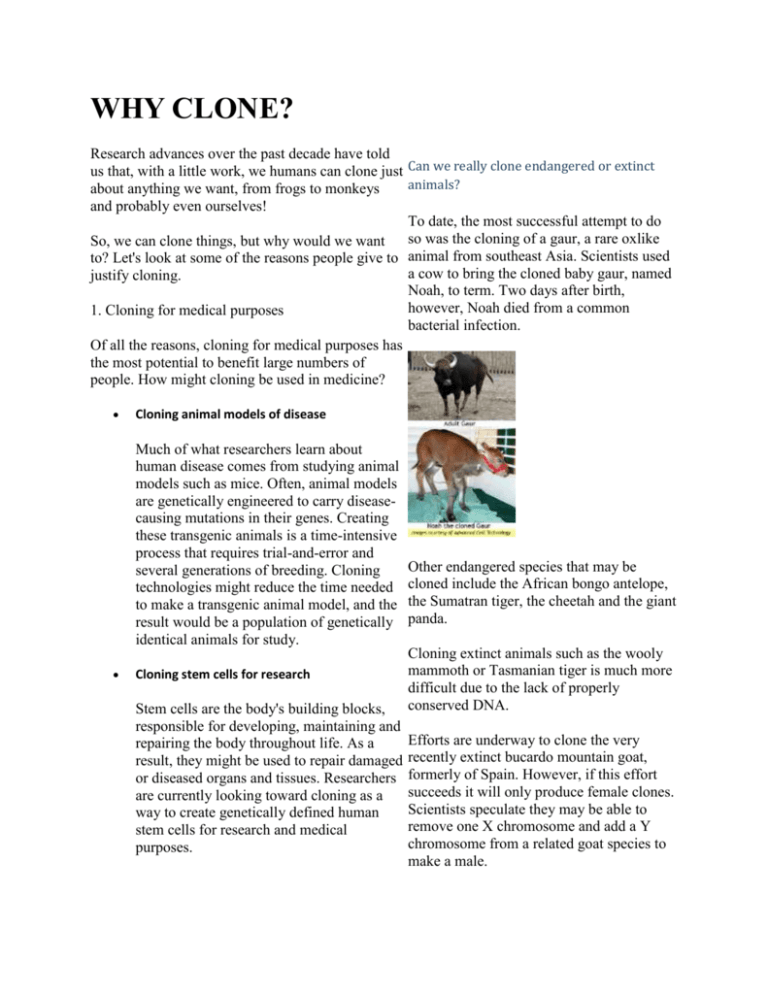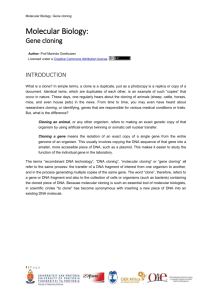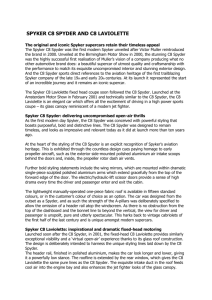
WHY CLONE?
Research advances over the past decade have told
us that, with a little work, we humans can clone just Can we really clone endangered or extinct
animals?
about anything we want, from frogs to monkeys
and probably even ourselves!
To date, the most successful attempt to do
so was the cloning of a gaur, a rare oxlike
So, we can clone things, but why would we want
to? Let's look at some of the reasons people give to animal from southeast Asia. Scientists used
a cow to bring the cloned baby gaur, named
justify cloning.
Noah, to term. Two days after birth,
however, Noah died from a common
1. Cloning for medical purposes
bacterial infection.
Of all the reasons, cloning for medical purposes has
the most potential to benefit large numbers of
people. How might cloning be used in medicine?
Cloning animal models of disease
Much of what researchers learn about
human disease comes from studying animal
models such as mice. Often, animal models
are genetically engineered to carry diseasecausing mutations in their genes. Creating
these transgenic animals is a time-intensive
process that requires trial-and-error and
several generations of breeding. Cloning
technologies might reduce the time needed
to make a transgenic animal model, and the
result would be a population of genetically
identical animals for study.
Cloning stem cells for research
Stem cells are the body's building blocks,
responsible for developing, maintaining and
repairing the body throughout life. As a
result, they might be used to repair damaged
or diseased organs and tissues. Researchers
are currently looking toward cloning as a
way to create genetically defined human
stem cells for research and medical
purposes.
Other endangered species that may be
cloned include the African bongo antelope,
the Sumatran tiger, the cheetah and the giant
panda.
Cloning extinct animals such as the wooly
mammoth or Tasmanian tiger is much more
difficult due to the lack of properly
conserved DNA.
Efforts are underway to clone the very
recently extinct bucardo mountain goat,
formerly of Spain. However, if this effort
succeeds it will only produce female clones.
Scientists speculate they may be able to
remove one X chromosome and add a Y
chromosome from a related goat species to
make a male.
"Pharming" for drug production
Farm animals such as cows, sheep and goats
are currently being genetically engineered
to produce drugs or proteins that are useful .
in medicine. Just like creating animal
models of disease, cloning might be a faster
way to produce large herds of genetically
engineered animals. Find out more about
this research in the feature article Pharming
for Farmaceuticals.
2. Reviving Endangered or Extinct Species
Have you seen Jurassic Park? In this feature film,
scientists use DNA preserved for tens of millions of
years to clone dinosaurs. They find trouble,
however, when they realize that the cloned
creatures are smarter and fiercer than expected.
Could we really clone dinosaurs?
In theory? Yes. What would you need to do this?
A well-preserved source of DNA from the
extinct dinosaur, and
A closely related species, currently living, that
could serve as a surrogate mother
In reality? Probably not. It's not likely that dinosaur
DNA could survive undamaged for such a long
time. However, scientists have tried to clone
species that became extinct more recently, using
DNA from well-preserved tissue samples. For an
example, see "Can we really clone endangered or
extinct animals?" on the right side of this page.
3. Reproducing a Deceased Pet
No joke! If you really wanted to, and if you had
enough money, you could clone your beloved
family cat. At least one biotechnology company in
the United States offers cat cloning services for the
privileged and bereaved, and they are now working
to clone dogs. But don't assume that your cloned
kitty will be exactly the same as the one you know
and love. Why not?.
4. Cloning Humans?
To clone or not to clone: that is the question. The
prospect of cloning humans is highly controversial
and raises a number of ethical, legal and social
challenges that need to be considered. To explore
some of these, see What are Some Issues in
Cloning?
Why would anyone want to clone humans? Some
reasons include:
To help infertile couples have children
To replace a deceased child
From a technical standpoint, before humans are
cloned, we need to have a good idea of the risks
involved. How sure can we be that a cloned baby
will be healthy? What might go wrong? To evaluate
the technical challenges to cloning, see Risks of
Cloning.
Supported by a Science Education Partnership
Award (SEPA) [No. 1 R25 RR16291-01] from the
National Center for Research Resources, a
component of the National Institutes of Health,
Department of Health and Human Services. The
contents provided here are solely the responsibility
of the authors and do not necessarily represent the
official views of NCRR or NIH.
Authorities arrest 14-year-old
for school threat
Tue, Sep 27 2011
By David Schwartz
PHOENIX (Reuters) - A 14-year-old Phoenix boy was arrested by sheriff's deputies on Tuesday for threats
made over the Internet to "go on a killing spree" and then commit suicide at his former middle school,
authorities said.
The boy was taken into custody without incident at his home after posting the threats in the comments
section of a YouTube music video for the hit song "Pumped Up Kicks," said Sergeant Jessie Spurgin, a
Maricopa County sheriff's spokesman.
"He gave out a specific place and time for when it would happen," Spurgin said. "That made it a little
more credible in our eyes."
Spurgin said a sawed-off shotgun was later found during a search of the boy's north Phoenix home,
where he lives with his grandfather. He said investigators were trying to determine if there was a
connection between the threats and the weapon.
Spurgin said the boy, who was not identified, had admitted posting the threats on the site.
Sheriff's deputies were tipped off to the ex-Wigwam Creek Middle School student by an out-of-state
YouTube viewer who went to the site for "Pumped Up Kicks," by Foster the People.
The lyrics of the catchy top-40 pop single talk of a "cowboy kid" who found "a six shooter gun."
The chorus of the song is: "All the other kids with the pumped up kicks you'd better run, better run,
outrun my gun. All the other kids with the pumped up kicks you'd better run, better run, faster than my
bullet."
Ann Donahue, community liaison for the Litchfield Elementary School District, said the boy was not a
"disciplinary problem" while attending the school as a sixth-grader from October 2010 to March 2011.
"He just moved away," Donahue said. "There was no trouble."
She said school went on as scheduled on Tuesday, with only a "small amount of absences" caused by
news of the threat.
Spurgin said deputies were stationed at the school to provide additional security.(Editing by Steve
Gorman, Jerry Norton and Greg McCune)
10 Risky Behaviors More Common in Sleepy Teens
By Meredith Melnick Thursday, September 29, 2011
More than two-thirds of teens aren't getting enough sleep on school nights and that's a problem. According to the
latest study by the Centers for Disease Control and Prevention, sleepy teens were more likely to engage in risky
health behaviors, compared with their 8-hours-a-night peers.
Research consistently shows that poor sleep is linked to negative health outcomes, like high blood pressure, weight
gain and even early death. Sleeplessness during adolescence, largely fueled by computer and Internet use, has also
been linked with an increased risk of depression and anxiety.
Last year, the medical journal Sleep published a series of studies on the consequences of sleeplessness among teens.
I wrote, at the time:
Researchers found that for each hour of lost sleep, levels of psychological distress rose by 5% in nearly 3,000 17-to24-year-olds who were followed for 12 to 18 months. Overall, short sleepers were 14% more likely to report
symptoms of psychological distress on a standard test, compared with people who got adequate sleep. The effect
was especially pronounced among young people who already suffered from anxiety; in this group, lack of sleep
triggered more serious mental health problems like full-blown depression and even bipolar disorder, according to the
study's lead author, Professor Nick Glozier. But even among those who began the study in good health, less than
five hours of sleep meant tripling their odds of psychological distress.
The new findings, which were based on data from the 2007 National Youth Risk Behavior Survey, fit in with past
research. The study authors found that 69% of more than 12,100 adolescents aged 12 to 18 reported getting less than
the recommended 8 hours of sleep on the average school night. Sleep-deprived kids were more likely than their
well-rested peers to report the following 10 risky health behaviors:
Drank full-sugar soda at least once per day
Participated in 60 mins. of physical activity fewer than twice in the preceding week
Spent three or more hours each day on the computer
Had been in at least one physical fight
Smoked cigarettes
Drank alcohol
Used marijuana
Was sexually active
Had feelings of sadness or hopelessness
Seriously considered attempting suicide
Of course, it's impossible to know whether teens' sleeplessness contributed to these problems, or the other way
around. It's could well be that things like depression, lack of exercise, Internet use and drinking high-sugar
beverages may interfere with proper sleep. But the study, which was published online by Preventive Medicine, is the
first to draw associations between lack of sleep and risky health behaviors on a national scale.
The researchers suggest that public health policies encouraging more sleep in teenagers — such as starting the
school day later —are needed. "Many adolescents are not getting the recommended hours of sleep they need on
school nights. Insufficient sleep is associated with participation in a number of health-risk behaviors including
substance use, physical fighting, and serious consideration of suicide attempt," said the CDC's Lela McKnight-Eily
in a statement. "Public health intervention is greatly needed, and the consideration of delayed school start times may
hold promise as one effective step in a comprehensive approach to address this problem."Find this article at:
http://healthland.time.com/2011/09/29/10-risky-behaviors-more-common-in-sleepy-teens/
Saab owner to sell Spyker for $44 million
10:49am EDT
AMSTERDAM (Reuters) - Swedish Automobile (SWAN.AS: Quote, Profile, Research, Stock
Buzz), owner of cash-strapped car maker Saab, said it would sell its Spyker luxury sports car
business to the private equity firm of racing car enthusiast Alex Mascioli for about 32 million
euros ($44 million).
Swedish Automobile has struggled for months to stave off bankruptcy, seeking new investors
and selling off various assets so that it could pay suppliers and employees and resume production
at its Saab plant in Sweden.
Last week, Saab won a reprieve when a Swedish court granted it protection from creditors while
it awaits funding from Chinese investors.
Niche sportscar maker Spyker was one of several assets put up for sale by Amsterdam-listed
parent Swedish Automobile, but a deal with Russian businessman Vladimir Antonov announced
earlier this year subsequently fell through.
Spyker sports cars have appeared in Hollywood films including The Pink Panther and Basic
Instinct 2. Only a few dozen are produced each year, with a list price of about 200,000 euros for
the C8 Aileron.
Mascioli, 36, a managing director at North Street Capital based in Connecticut, told Reuters that
even though he has owned a few racing cars, he has never owned a Spyker or an entire car
company.
"I like to throw a car around a track but I've never been professional," he told Reuters, adding
"it's a North Street Capital project. I am not buying this as a toy."
Mascioli said he expected the Spyker deal to close within a month and would then focus on
raising awareness of the Spyker brand.
"Considering Spyker hasn't had a budget like Ferrari or Aston Martin, it's got a very decent track
record," said Mascioli.
"The operations will remain where they are and Victor (Muller) will remain the CEO and deal
with the day-to-day operations. My role will be an outlet for providing resources for the
company in order for them to increase their operations," said Mascioli.
Swedish Automobile said North Street had the resources to take a long-term view on the
development of Spyker as a high-end sportscar manufacturer.
"This is not a complicated transaction. It's a very, very straightforward, all-cash deal, which I
expect will be closed within a month," said Victor Muller, who is chief executive of Swedish
Automobile, Saab and Spyker, in a phone interview with Reuters.
The proceeds from the sale of Spyker will be used to pay down Swedish Automobile's debt to
Tenaci, Muller's private investment company. Muller said Tenaci would then use the funds to
repay a loan to Antonov.
Swedish Automobile announced in February it had agreed to sell Spyker to CPP Global
Holdings, Antonov's UK holding company, saying the deal could raise about 32 million euros.
But at the end of August, it said the deal had been put on hold. Muller on Thursday denied talk of
a falling out with Antonov, saying their relationship was "excellent."
Antonov has been waiting in the wings to take a stake in Swedish Automobile and put up
financing, but he needs the approval of the European Investment Bank (EIB), the Swedish
government and former Saab owner GM (GM.N: Quote, Profile, Research, Stock Buzz).
This is because the government has guaranteed a loan to Saab from the EIB and GM still has
preference shares in Saab.
"Antonov isn't out of the game but he currently has a passive role because he has no choice. But
as soon as the way is paved for his possible return it is up to him to make that choice. It's his
call," Muller said.
Muller said he is looking for a new CEO for Saab and may announce a candidate within a month.
Swedish Automobile shares initially jumped 16 percent on the news of the North Street deal but
gains were later trimmed to about 4 percent by 1300 GMT.
(Editing by Sara Webb and Helen Massy-Beresford)
© Thomson Reuters 2011. All rights reserved. Users may download and print extracts of content
from this website for their own personal and non-commercial use only. Republication or
redistribution of Thomson Reuters content, including by framing or similar means, is expressly
prohibited without the prior written consent of Thomson Reuters. Thomson Reuters and its logo
are registered trademarks or trademarks of the Thomson Reuters group of companies around the
world.
Greece on the Skids
The prime minister must remake his country. Fat chance.
by Christopher Dickey | September 25, 2011 10:00 AM EDT
The cocktail reception for the prime minister of Greece was to be held in the Rotunda of the
Pierre Hotel in New York City, where trompe l’oeil frescoes show New York socialites mingling
with ancient deities. The setting, a prelude to a $1,000-a-plate dinner, would have been a fitting
backdrop for the launch of George Papandreou’s weeklong visit to the United States. The
Minnesota-born politician, after all, is almost as American as he is Attic. His critics say he’s
imperious, trying to reinvent a whole people. And much of the financial world has decided his
extraordinary efforts to save Greece from collapse (and Europe from financial chaos, and the
world from another massive economic shock) are, like the frescoes at the Pierre, a thin façade
meant to fool the eye.
In the event, Papandreou didn’t even make it to the party. Just hours before he was to fly from
London to New York, he suddenly canceled all his appointments at the United Nations, the
International Monetary Fund, and the U.S. Treasury, and headed back to Athens. At an
emergency cabinet meeting his government agreed to cut tens of thousands more public-sector
employees from its payroll, albeit gradually, and to tax incomes as low as €5,000 a year. In
return, Greece probably will get a desperately needed €8 billion, paid from a massive rescue fund
set up by the IMF, the EU, and the European Central Bank (now known as “the troika”). But the
pressure continues for Papandreou to cut ever more deeply into the public sector (jobs, benefits,
pensions)—and thus into the core support of his Socialist Party.
At cabinet meetings, the atmosphere of doom hangs so heavy in the air that ministers sometimes
seem just to be going through the motions of debate. “There is a sense of inevitability,” says one.
The medicine has to be taken. But as another senior Greek official asked aloud, “Will the
medicine kill the patient?”
It’s at times like this that Papandreou’s friends like to talk about how cool he can be under
pressure, and about one particular incident from his childhood. In 1967, when Papandreou was
14, the Greek military seized power, and soldiers went to his house in Athens looking for his
father, former Socialist prime minister Andreas Papandreou. They couldn’t find him, but they
figured he was still around. So one put a gun to young George’s head. “Andreas, come out,
wherever you are hiding,” said the officer, “or I will shoot your son.” Harvard economist Richard
Parker, a family friend since 1973, says that was “George’s introduction to politics.” (Andreas
did show himself.)
Greece's Prime Minister George Papandreou., Kostas Tsironis / Bloomberg-Getty Images
“George had to make deep decisions as he was growing up about what kind of man he would
be,” says Parker. “For a long time he resisted going into politics.” In fact, this son and grandson
of prime ministers is something of a stranger in his homeland. For much of his childhood his
father was teaching abroad or in exile. He lived in the United States, Canada, and Sweden. He
went to Amherst College, Stockholm University, Harvard, and the London School of Economics
(he occasionally still makes mistakes in Greek grammar). In many circles, despite his dynastic
credentials, “he’s seen as an American-Canadian-raised kid who doesn’t basically understand the
Greek character and is trying to do reforms the way you might do them in Denmark,” says John
Psaropoulos, former editor of the English-language Athens News. “His heart is in the right place,
but he’s kind of hapless.” The term “consensus builder” is used against him these days, as are
analogies with the ever-compromising American President Barack Obama. Many Greeks think
“he lacks the political balls to say this is what he is going to do and get it done,” says
Psaropoulos.
Perhaps. But what Papandreou says he wants, in fact, is to change the entire way Greece and the
Greeks go about their business. Slowly, perhaps too slowly, he has made some progress. He is
pushing for much greater accountability and efficiency in the bloated public sector. He has
brought down the deficit. He has tried to come up with novel ways to collect taxes in a country
where records are still kept on paper. He has tried to free the private sector from the
entanglements of bureaucracy. But Papandreou is constantly fighting what Parker, now an
informal adviser, calls “the narrative of the wastrel state.”
Greece is a country where it’s said, only half in jest, that everyone rips everyone off because
everyone feels somebody else is going to rip them off. And that includes, of course, their own
government. When Papandreou took office in 2009 he discovered the books had been so cooked
that the deficit turned out to be not 3 percent of GDP, which was the target, or 6 or 7 percent,
which was claimed, but a whopping 13 percent. No, scratch that. It was 14 percent. No, wait a
minute—the more the government finds out, the worse the picture looks, and the current
calculation of the deficit Papandreou inherited is now stated as 15.5 percent of GDP.
Papandreou ran on a platform of transparency, and when he started making these figures public,
the markets were stunned. “One thing was clear in everyone’s mind: that Greece and the Greeks
had to be quote-unquote punished,” says Foreign Minister Stavros Lambrinidis with evident
irony. (An Amherst grad himself, he was speaking to the same crowd at the Pierre that had been
stood up by Papandreou the day before.)
Hedge funds, sensing volatility like sharks sensing blood, closed in on Greece. Its debt
skyrocketed far beyond its ability to pay, getting worse as speculation grew that the country
might default. The downward spiral was only slowed, not stopped, by the massive bailout
package of €110 billion that Europe agreed to in 2010, followed up this July by another package
of €109 billion. But to get that money, targets have to be met. And that gets harder to do because
the European economy, generally, is slowing down. Greece’s economy has shrunk this year by
an estimated 5.3 percent.
So the question of whether Papandreou really can transform international attitudes about the
Greeks—and the Greeks’ attitudes about themselves—becomes almost as crucial as the numbers.
“Economy is psychology,” says Foreign Minister Lambrinidis. Greece has to convince the
international community—especially the French and Germans, whose money is so vital to
Greece—that it really is changing. If they don’t believe that’s the case, they can’t and won’t
continue working to stave off default.
But the Greeks are getting restive. They’ve never been shy about taking to the streets when they
feel they’ve been wronged. Parker went with Papandreou this past summer to a town-hall
meeting in a remote village in the far west of the country. Papandreou listened for hours to
complaints and suggestions from about 100 townspeople. This was the Greece of the taverna,
deeply Mediterranean, deeply resistant to change that compromises its relaxed way of life.
Papandreou talked about sacrifice. He never surrendered a point. He never lost his temper. And
he took notes on his iPad.









